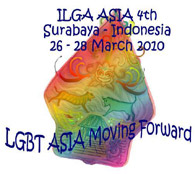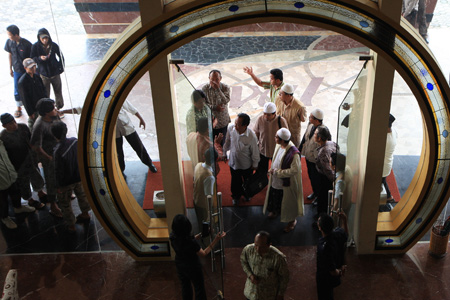The 4th ILGA ASIA conference was to take place in Surabaya, Indonesia from the 26th to the 28th of March 2010, however, due to unforeseen and unfortunate circumstances, the conference had to be cut short.
International Lesbian and Gay Association (ILGA) is the only worldwide federation campaigning for lesbian, gay, bisexual, trans and intersex (LGBTI) rights and was established in 1978. The aim of ILGA is to work for the equality of LGBTI people and their liberation from all forms of discrimination. It seeks to achieve this aim through the worldwide cooperation and mutual support of its members.

ILGA ASIA is the Asian branch of ILGA and it has successfully organised conferences in India, the Philippines and Thailand in the past. ILGA ASIA has over 160 member organisations in more than 17 countries across Asia.
ILGA Asia accepted the proposal of GAYa NUSANTARA, the oldest LGBT organisation in Indonesia, to host the fourth Regional Conference of ILGA Asia in Surabaya, Indonesia.
The conference organisers received endorsements from the local city police to hold the conference. However, as news of the conference became known to local media and groups of fundamentalists, who opposed the conference, they began to threaten to disrupt the conference and upset the participants with violent protests. The police withdrew their endorsement of the conference fearing to not be able to control the fundamentalists and the safety of the conference participants. ILGA ASIA was then forced to announce that the conference was “officially” cancelled.

The conference was to be held at the Mercure Hotel (Accor Hotels Group), with many of the participants coming from all over Asia and who were staying at the hotel. The management of the hotel then decided that they were very uncomfortable to host the conference and accommodate the participants. Two days prior to the start of the conference, the management of the hotel demanded all the participants to vacate their rooms, which had been paid for, and find alternative accommodation. The Oval Hotel, kindly accepted to host the event and provide the rooms needed for those who had to leave Mercure. The conference organisers tried their best to mobilise as much support from high-level public figures, to persuade the police to return to their initial endorsement, but to no avail.
On Thursday the 25th of March the ILGA ASIA board called for a meeting with all the participants and explained the situation to them and the possible risks in continuing with the conference. In spite of all the threats and potential risks, the participants and the board decided to go ahead with a “meeting of activists”, as this is why they had come to Surabaya. The ILGA ASIA board commends the commitment and determination of the activists in Asia and their tenacity in wishing to persevere with the agenda under extremely difficult circumstances and to help build a world where all people are free and equal.
In the morning of Friday the 26th of March at 8.30am, the activists gathered in the corridor of the 4th floor of the Oval Hotel where Dédé Oetomo, director of GAYa NUSANTARA, Poedjiati Tan and Sahran Abeysundara, representatives of ILGA ASIA to ILGA, welcomed all the delegates and declared the “Meeting of Activists” open. Four energy packed workshops were carried out throughout the morning taking place in rooms of the board members for security reasons. Over 100 representatives from more than 12 countries participated and the atmosphere was electric.
By midday the board had received information that a group of fundamentalists had mobilised themselves after Friday prayers and were heading towards the hotel. For the safety of the participants and in the best interest of all those involved, the board decided to cancel the programme of events for the afternoon session. The heads of the fundamentalist groups entered the hotel and sat around a table in the lobby, adjacent to the elevators, talking to one another, while other demonstrators grew into a larger threatening crowd outside of the hotel lobby. The heads of the opposing groups (the Unity Front of the Community of Islam (FPUI), an ad-hoc coalition of 7 conservative and hard-line Islamic groups including the Indonesian Council of Ulemas (MUI), Indonesia's top Muslim clerical body, the Islamic Defender Front (FPI), a local extremist group that is known for violent tactics, and the Hizb ut-Tahrir Indonesia (HTI), a local chapter of a worldwide network by the same name that is believed to be very active in a number of countries including the United Kingdom despite being banned by many governments) demanded to speak to the ILGA ASIA organisers and Mr King Oey, a member of the ILGA ASIA board and part of the organising committee tried to reason with them, only to be assaulted in return.

The heads of the fundamentalist groups entering Oval hotel at about 1.20pm.
(Click to see more photos.)
Moments later, the regional board and the Secretaries Generals of ILGA and the communications team met to analyse the situation and to take necessary measures and further precautions. This involved hours of negotiation with the police and the management of the hotel. At around 4 pm, dozens more protesters arrived at the Oval Hotel and the atmosphere became more heated. The police wanted to terminate their responsibility by pressuring the conference delegates and organisers to leave the hotel immediately. Only after the mediation of some prominent public figures who were among the participants, the police finally offered protection to the participants and the hotel management accepted that they could remain in the hotel until the end of their reservations. The police also negotiated with the demonstrators and told them that it had decided to give protection to the delegates. The demonstrators however refused to leave and began to put more and more pressure on to the organising committee promising to return armed the next day. By early evening, it became necessary to evacuate the participants in groups of four. Some were aided by their embassies, others who managed to change their flights were taken directly to the airport, whilst others were moved to different hotels and some left Surabaya by land to neighbouring cities. A few remained at the hotel as “tourists”. The ILGA ASIA board wishes to thank all Indonesian activists who coordinated and put their necks on the line to ensure the safety of all the participants.
On Sunday 29 March, news spread quickly regarding an article that appeared in the Jakarta Post that morning, that the fundamentalists had threatened to come to the Oval hotel and physically remove all remaining foreigners and to take them directly to the airport. The Secretaries General of ILGA left the hotel with the last participants to a hotel near the airport, where the last departures were arranged. On the same day, news spread in relation to the Ministry of Religious Affairs, announcing a court action against the organising committee for “activities against religion”.
All iInternational participants left Indonesia and have arrived safely back to their home countries leaving the Indonesian activists to face harder challenges ahead of them.
ILGA, as part of an international coalition of LGBTI rights defenders, has initiated a coordinated operation to denounce and protest against the attack that occurred, with the concerned international bodies and to demand action from these as a result. Many voices have risen, in Indonesia and in different countries around the world, demanding the respect of human rights of LGBT people and the right to assembly.
The demand of action is based on the fact that in Indonesia:
(a) The constitution has a strong equality clause
(b) The constitution is based on secular principles
(c) Indonesia has ratified the major UN human rights treaties
The ILGA ASIA board wishes to thank all the activists that had assembled from all parts of Asia and for showing great courage in the face adversity. We wish to thank our funders [Global Fund for Women, Astraea, LGBTI Initiative of Open Society Institute, Hivos, Fridae and Oxfam-Novib] who have stood by us through this difficult time and have been a great source of strength. We are blessed by the many men and women in the Indonesian government who have stood up for our rights and have spoken out against the fundamentalists. But most of all, we are forever grateful to our Indonesian partners and the organizing team for showing great resolve and for standing up for what they believe in and showing the world what activism is all about. They are an inspiration to us all, their courage is to be admired and their commitment to a world free of prejudice and hate is a testimony to who they are.
The ILGA ASIA board stands firm in our belief that all people are created equal and free and that we all have the right to live as we are, and to love who we love. This incident has not weakened our movement but has only made us stronger. For we know our work is important and what we do changes the lives of so many people around Asia and the world. Our determination is that much stronger and our belief is that much more. Our work is not over until all people can live in a world that accepts us for who we are.
In Solidarity,
ILGA-ASIA BOARD
conference.asia@ilga.org
3 April 2010











 Printable Version
Printable Version










Reader's Comments
And dont bother messaging me because ive allready blacklisted you. I dont need some ignorent hick waffling on when they dont know the facts. Muwah!
It is not unexpected this happened in Indonesia but unless activists like ILGA make this visible no one would react.
Will Indonesia change, not likely I would think. Unfortunately religious fundamentalism is not open to accept people who are "different" and when governments do not exercise the secular laws it will be a slippery slope towards a very uncomfortable situation.
I's a good question, for the core prohibition under secularism is the prohibition against gaovernments from interpreting religious doctrine?
Does this Indoensian ministry do that?
Any Indonesians here who maight be able to answer my question?
Thank God this new generation has vim, vigor and class and doesn't walk around with a chip on its shoulder and a crappy attitude and bitchy and complaining all the time-- so a conference got into a bit of an uproar, laugh and move on with class, play some Vampire Weekend and dance anyway
now for some thoughts from the very yummy Rostam from Vampire Weekend:
Kudos to my generation of studs and super heroes!
Rostam Batmanglij
26 / Brooklyn, N.Y.
Keyboardist, Vampire Weekend
“Being Iranian and gay are two aspects of my identity I embrace,” says Vampire Weekend’s Rostam Batmanglij. Neither have they compromised success for the gentle-voiced musician, whose career couldn’t be hotter. Besides producing and playing keyboards for one of the most acclaimed rock bands today (VW’s Contra hit number 1 on Billboard’s album charts, and they’ve appeared on Saturday Night Live twice), Batmanglij performs with his side project, electro-pop duo Discovery. “I Wanna Be Your Boyfriend” is their much buzzed-about single, and he is optimistic about the song’s potential as a gay anthem. “The lyrics subconsciously comment on my own life. I wasn’t fully aware of their double meaning while I was writing it.” he says. “Growing up, there were artists like Tchaikovsky that I felt connected to before I knew they were gay or before I knew that I was gay.”
It is appalling that the protesters can threaten violence openly in front of police and get away with it!
Can you imagine a mob turning up at a religious gathering and threatening to use violence to stop the conference?
ahem...the true color show in their own countries.
Next time stop accuse the west for no freedom
Thank goodness no one was hurt!
Indonesia is technically a secular country. Our laws were not made based on religious rules or holy books. However, since the beginning of the birth of our nation, Soekarno (our first president) was looking for ideals that might unite the entire nation in order to gain full independence at 1945. One of them was religion. And in order to unite everyone with all sorts of different religion, Pancasila (the foundation of Indonesian Ideology) was made. Five main Ideals were created to unite the country, and the first one was " Believing in One God ". Under this ideology, 5 religions were officially allowed to be practiced in Indonesia: Islam, Catholics, Christianity (Protestants), Buddhism and Hinduism.
(Don't ask me why Catholics and Christianity (Protestants) were considered two separate religions, because I have no idea.)
Based on that, the government at that time felt that in order for Indonesia not to disintegrate, religion must be "properly taken care of". And that's the background of the creation of the Ministry of Religious Affairs. And as an "inconsistent" secular country, just to let you know that religion is mandatory to be declared on our ID.
As for the unfortunate event, I feel ashamed and embarrassed. Those delegates should not have been treated as if they were criminals against humanity. The police should have protected the delegates from day one. And as a born-muslim, I don't agree with the way the hardcore fundamentalists treated those delegates. I'm sure I am not the only who thinks that way in Indonesia. May Allah bless those delegates and the local organizers, and may Allah give those hardcores believers some consciousness that violence will never give positive outcome. Amen.
Well, it seems to me that there is some real violation of both secularism, which itself has a basis in the "equality" clause of the Constitution, as well as an outright violation of the Constitution itself in Indonesia. (That's not to single Indonesia out because the same can be said of both Malaysia and Singapore, although it is relatively more minor in the case of constitutional violations with regards to religion in Singapore.)
By naming either one or a handful of religions as having official sanction, governments are actually getting into the business of interpreting doctrine in that they regard the doctrines of one or more religions as having greater legitimacy than others.
In the case of Indonesia, how then does the government view the validity of doctrines from Sikhism or Taoism, for instance? (I believe that both communities exist in Indonesia.)
Governments are not elected - in the case of those that are elected - on the basis of their qualifications in theology. Almost 100% of individuals in governments worldwide are not qualified in that sense. Most definitely, individual politicians are not elected on the basis of their
Doctrinal interpretation is the specialization of religious leaders. (And even then, I say that with a huge grain of salt.)
Even in the rare cases of religious leaders-turned-politicians, those individuals are deemed to be qualified only to interpret the doctrine of their own religion only, and not those of others; this has wider implications for inter-communal relations and goes well byond the issue of LGBT rights, which should be why non-LGBTs also have a vested interest in this.
Then, assuming there is also the freedom of religion in Indonesia - is there a specific clause on this in the Indonesian Constitution? - then what of the legal status atheists and agnostics there because the right to choose a religion implies the right not to choose any. (The choice of one religion has the corollary of rejecting all others, an act which is not seen as causing harm or offence to the adherents of the religion that is rejected; the right to reject any one religion then gives rise to the right to reject all of them, equally without being interpreted as causing harm or offence to any one of them. Hey, I can decide that none of the religions that exist currently are worth my time!)
While there may be historical reasons specific to any one country for embarking on the course that it has with regards to how to implement secularism, the fact remains that the all the other reasons for the consistent application of secularism in the continent of its origin - Europe - continue to remain valid for all our countries.
I can say this with full confidence in the case of Singapore at least: cultural arrogance frequently stands in the way of seeing this.
Please log in to use this feature.